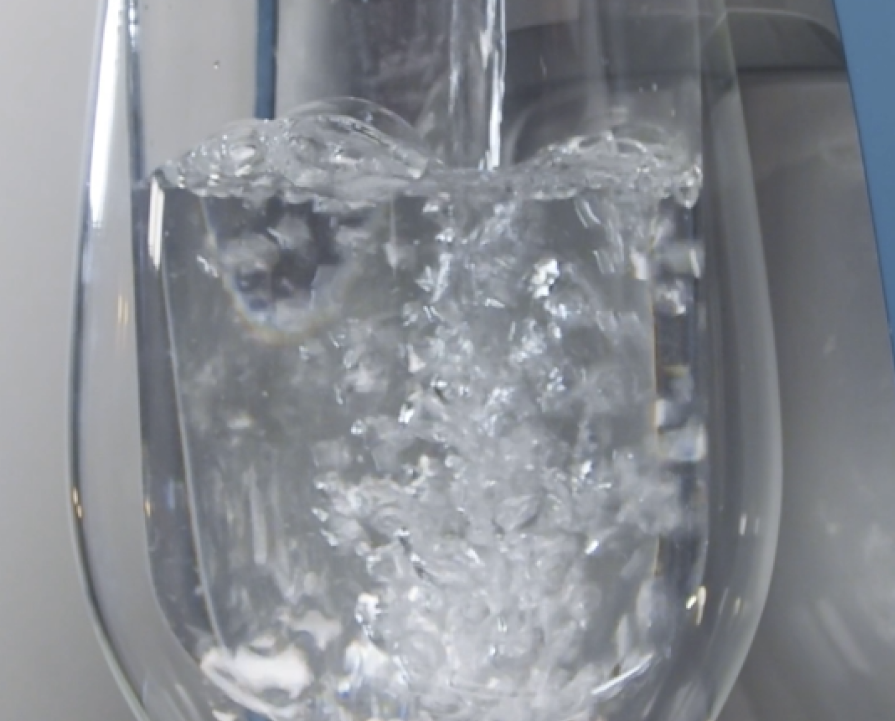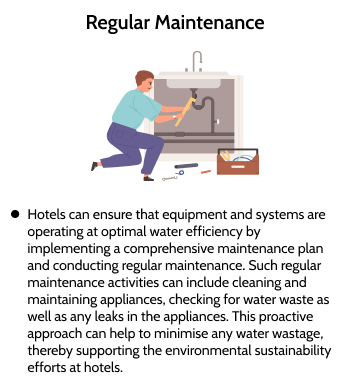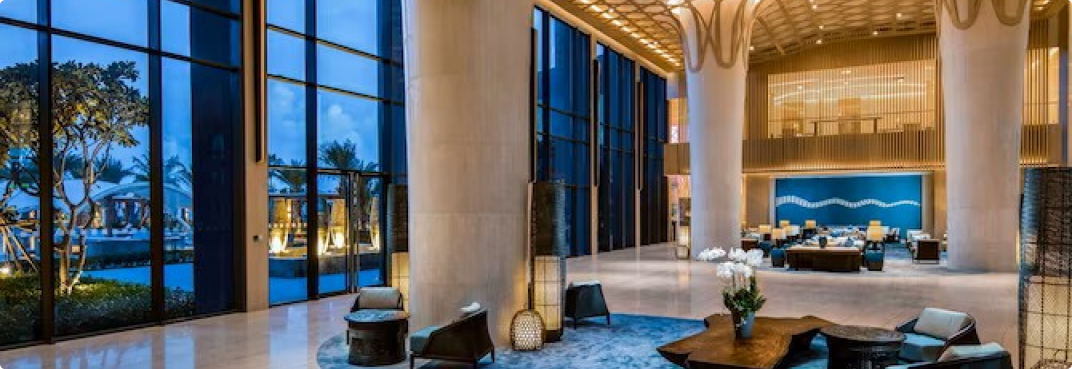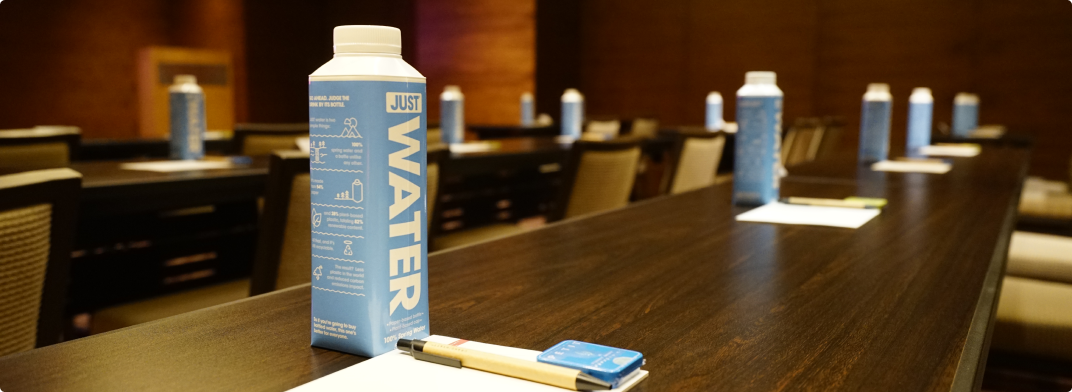
Water Conservation
Events & Food Management
Water is a valuable resource and is essential for hotel’s events and F&B services to function with highest business productivity.
F&B services within hotels consumes a large amount of water which is used for food preparation, cleaning, and other operations. With the rising concern in water scarcity, hotels must transform their water management within events and F&B spaces.
Our recommended methodology begins with an audit process, which analyses the current state of water usage during events and for F&B services within the hotel. These gathered audit insights are imperative in highlighting areas of concerns with inappropriate water usage.

With areas of water wastage clearly identified, hotels will be able to strategically develop and construct effective solutions that can optimise water usage and consumption with the greatest efficacy.
Some of the common non-exhaustive solutions include:
|
| Solutions: Improve water efficiency, conduct regular maintenance, implement good habits and practices |
| Educate: Educational engagements with staff and guests on water conscious behaviors | |
| Monitor and Review: Implementation of water monitoring systems, and conduct regular checks on meters or related information systems to effectively manage the hotel’s water usage and consumption in a strategic and orderly manner |
Effective water management practices not only help reduce the negative impact of water usage in hotels it also enhance the hotel's branding and reputation by showcasing their commitment to sustainability, further aligning with environmentally conscious guests and partners.
Global Best Practices
General Audit
Water audit is a comprehensive analysis of the water usage in the operations to identify any inefficiencies and potential cost savings. Conducting water audit for events and F&B services within the hotel operations provides a detailed picture of the water usage associated with these services.
This process comprehensively documents the way the kitchen uses water within its operation, including when and how much water is typically consumed. For instance, water is used for food preparation, cleaning, and washing dishes in F&B services. Meanwhile, events require water for a range of purposes such as cleaning and maintaining the venue, landscaping, and restrooms.
Typically, an audit process consists of a few main steps. Some of these steps may vary in different industries and sectors, however, the general flow remains the same.

Solutions
Based on the audit insights gathered, hotels can deploy a variety of solutions to achieve higher efficiency in their water usage.
By implementing solutions such as installation of water efficient hardware, regular maintenance and developing good habits, hotels can significantly reduce water consumption and associated costs.
While most of the solutions for reducing water consumption for event venue are covered in Operations management – water section, we will look at some of the common solutions for food management here.
The strategies can be used independently, or in smart combinations to optimize water efficacy that will lead to cost savings, higher business productivity and greater guests’ satisfaction.
Here are some of the common solutions that highlight the effectiveness of managing water use and management. Do note that the list provided is non-exhaustive.



Education
Case Studies
International
Radisson Hotel Group (RHG) - Water Education

Radisson Hotel Group is an international hotel group, with over 1,150 hotels in operation and under development. The international hotel group is rapidly growing with a plan to significantly grow the portfolio. The Group’s overarching brand promise is Every Moment Matters with a signature Yes I Can! service ethos.
Radisson Hotel Group has a long history of being a responsible business, with an ambitious and award-winning program focused on three pillars: Think People, Think Community, and Think Planet. At Radisson Hotel Group we care for people, communities and planet and aim to be Net Zero by 2050 based on the approved near-term Science Based Targets. With unique solutions such as 100% carbon neutral Radisson Meetings, we make sustainable hotel stays easy. To facilitate sustainable travel choices, all our hotels are becoming verified on Hotel Sustainability Basics.
Hotel Sustainability Basics
- RHG, along with other brands, associations, and destination, launched Hotel Sustainability Basics (HSB)– an initiative that will drive responsible and sustainable travel globally and will rolled out in RHG by 2024.
- HSB will raise the global starting level of hotel sustainability in a transparent and easy-to-understand manner for all travelers and stakeholders. HSB will help drive Responsible Travel on a global scale and involve clients to DO GOOD BY BOOKING RIGHT.
- It is a program run by the World Travel & Tourism Council, supported by 70 hotel companies, organizations and destinations, collectively representing 50,000 hotels. In India, this includes supporters like HAI and IHCL.
- HSB contains 12 criteria focused on efficient resource use, planet and people with progress built into the framework.
- To ensure the validity of the program, WTTC partnered with Green Key and SGS to develop a simple online verification system that allows hotels and other tourist accommodations to be verified for meeting eight of the 12 criteria in the first year and demonstrate their commitment to working toward all 12 of the criteria by year three.
Net Zero
- RHG is committed to be Net Zero by 2050, is validating its targets based in Science (Science Based Targets) on track to be aligned with the Paris Agreement (COP21) and has taken active steps towards this goal. Two main levers are the increasing the energy efficiency of hotel buildings and transitioning to renewable energy.
- In the past 10 years, RHG has reduced its average energy and water footprint by 30%.
- As intermediate targets, RHG is reducing its carbon footprint by 30% over the next 5 years and halving the footprint by 2030, as well as reducing consumption of natural resources, using renewable energy and phasing out single-use plastics.
- To cooperate with the asset owners on the journey to Net Zero, RHG has defined building design guidelines that allow owners to reach the level of the main building ecolabels (LEED, BREEAM and EDGE).
- Our regular technical standards bring them 50% there with requirements on insulation, building management systems, heat recuperation, 100% LED lighting etc. The additional Build Planet & Build Planet Advance guidelines help owners take the extra steps to futureproof their buildings.
- In our APAC portfolio we count leading examples such as
o Radisson Suzhou – an EDGE certified building
Markers of the achievements that earned the property EDGE certification include a 22% energy savings, a 27% water savings and 28% less embodied energy in materials.
o Radisson Blu Faridabad is LEED GOLD certified
o Radisson Blu Resort Fiji
o Solar system provides 20% of daily electricity needs and is the largest solar installation in a hotel in the pacific. it helps avoid the importation of 175,000 litres of diesel every year.
o Radisson Resort & Spa Lonavala: ecological design repurposing local naturel materials
One of Radisson Hotel Group’s key focus areas is the responsible use of water. The company recognizes the importance of this precious resource and is taking steps to ensure that water use is equitable throughout the communities in which we operate. To reduce water consumption, the Group has developed specific measures and a toolkit that includes tools and solutions for guest rooms, pools, landscaping and technical facilities, including kitchens.
Radisson Hotel Group has also installed water-saving technologies in high water-use areas and engages guests through initiatives such as its towel reuse program within its green housekeeping program.
The Group recognizes that employees are part of the water-saving solution and ensures that they are well equipped with water-saving knowledge. As part of the Think Planet Water initiative, Radisson Hotel Group provides training videos to educate housekeeping, laundry and kitchen staff on how to safely reduce their water consumption.
References: RHG Responsible Business Report 2021 (radissonhotels.net) | Radisson Hotels
Local
Grand Hyatt Singapore - Green Technology

The Grand Hyatt Singapore is dedicated to taking a holistic approach to sustainability in multiple areas of the hotel, with the aim of protecting the planet. As part of its efforts towards water management in the kitchen, the hotel has implemented several initiatives.
These include the installation of three Meiko dishwashing machines and one Granuldisk pot-washing machine. These machines are more water and energy-efficient and enable the hotel to turnover cooking utensils, equipment, and serving plates in the fastest possible time.
Since their installation, these machines have been incredibly effective. They have saved the following:

As a result, the total amount of water used by the hotel has decreased by 30% from 300k cubic meters in 2015 to below 200k cubic meters in 2020.
Monitor & Review
Monitoring and tracking water consumption in events and F&B services can help hotels evaluate the effectiveness of their water-saving initiatives. With tracking systems in place, hotels can make smart and informed decisions about how to further optimise water conservation efforts.
In addition, monitoring and tracking water consumption in events and F&B services can help to raise awareness among staff about the importance of water conservation and their daily water habits. Small daily changes, starting from reducing water usage to encouraging staffs’ participation in sustainability practices will result in cumulative positive impacts.
Successful water conservation requires continuous monitoring and analysing of water consumption. The data obtained will be able to provide updates on water usage patterns on equipment and systems, which can then help in identifying opportunities for further energy savings and reducing cost associated with water consumption.
